Precious Bible Virus
This article will certainly aid you to get rid of fully Precious Bible from impacted internet browsers and PC. Follow the adware elimination guidelines at the end.
The internet app Precious Bible offers an adware program that assures an accessibility to the most popular games on the internet today. In the beginning look, it appears that you only require to develop an account in Precious Bible to obtain an immediate accessibility to unlimited downloads and video streaming. But when you get to the final action of the enrollment the platform advises you to make a repayment in order to finish the process. However, in case you pay for the program, all you get is just an adware application that floods your web browser with awful advertisements such as pop-ups, pop-unders, and also banners in an attempt to generate profits for its proprietors.
Precious Bible Redirect
Precious Bible adware may contaminate your computer system by means of setups of third-party software application. Such applications are usually used for free on numerous torrent web sites yet what might stay surprise are some extra elements that become part of their arrangements. Consequently, those added potentially unwanted parts could be set up on your PC without your expertise. You can avoid the installment of possibly undesirable programs like Precious Bible by picking the Customized or Advanced settings in the setup as there you need to have a choice to deselect them and also proceed with the installment of the main software.
Advertisements that become part of malvertising campaigns may also be made use of for the spread of Precious Bible adware. Pop-ups, pop-unders, and also banners could redirect you to damaged website that are readied to download and install automatically the adware on the computer system. The adware is believed to impact all generally used web browsers so you might witness its existence in Mozilla Firefox, Google Chrome, Web Explorer and Safari.
What is Precious Bible Virus
Precious Bible is a web site that presses an adware program of the same name. The site is presented as a platform that offers instantaneous accessibility to different fashionable video games. Despite the fact that it asserts that you might access its web content for free you require to pick a layaway plan right after you make a decision to develop a profile.
Have in mind that the first subscription for Precious Bible’s solutions provides only a five-day totally free trial duration. After this period the adware will instantly extract an amount of around $50 from your bank card as well as will keep doing it every next month. Beware that this awful adware will attempt to scam you once more if you want to unsubscribe. The second scam urges you to call an assistance number which is once again offered as a tax-free however in fact, it will cost you a great deal of money if you make the blunder to call it. So be very careful what info you supply to such dubious services as they can misuse it in a great deal of means.

Threat Summary
| Name | Precious Bible |
| Type | Adware, PUP |
| Short Description | Attempts to obtain your credit card information. Generates lots of advertisements and causes redirects to other sites. It could also deliver malware to your PC. |
| Symptoms | You could see various annoying ads like pop-ups, banners and in-game ads to appear in affected browsers and system. Your browser is sluggish and sometimes unresponsive. |
| Distribution Method | Freeware Installations, Bundled Packages |
| Detection Tool |
See If Your System Has Been Affected by malware
Download
Malware Removal Tool
|
| User Experience | Join Our Forum to Discuss Precious Bible. |
Precious Bible Virus Description
Because of the reality that the primary function of Precious Bible’s owners is money profits, their item is highly likely to generate as much targeted promotions as feasible. Numerous sort of adverts like pop-ups, discount rates, banners, promo codes, sliders as well as various other may flood all web internet browsers affected by Precious Bible adware. For each and every click an ad produced by Precious Bible its proprietors earn money by the advertiser. This marketing plan is called pay-per-click as well as it is exercised by many trusted companies however when used by adware programs it threatens your online safety as well as the security of your equipment. This could be described by the fact that adware proprietors hardly ever care if marketers intend to promote safe and also reputable web pages. So a few of the approved ads might include links to hacker-controlled website. What might happen when you land on such a page is an undetected setup of malware straight on your device.
The Privacy Plan area is readily available at the bottom of Precious Bible homepage. The page provides information regarding what information is accumulated by the adware and exactly how it is used. Below you can see a screenshot of the Plan web page:
The policy mentions that this site collects individual details that is used for the advertising functions of its owners. Once they establish their campaigns your browser may be swamped by many irritating ads. As a result, your online experience may be no longer be so enjoyable as your web browser could end up being extremely slow-moving.
The following is a fascinating quotation from the plan:
Every now and then, we may utilize your individual info to send out vital notices, such as interactions concerning acquisitions and changes to our terms, problems, and also plans. Because this details is very important to your communication with japalta, you may not opt out of obtaining these communications.
Personal info which might be gathered from you:
- Call
- Mailing address
- Telephone number
- Get in touch with preferences
- IP
- Credit card data
As it is specified in the policy by using the Precious Bible redirect website along with associated solutions or software program, you automatically agree with the collection of your details. All gathered details may be disclosed to 3rd party firms.

Remove Precious Bible Completely
The actions below will certainly lead you through the removal process of Precious Bible redirect. Want that occasionally the manual elimination might not be enough to eliminate entirely this unpleasant infection. For an effortless detection of all leftovers, you can scan the system with an innovative anti-malware device. Once the toll situate all possibly hazardous files you will be just a step away from the complete removal of Precious Bible from the PC.
- Windows
- Mac OS X
- Google Chrome
- Mozilla Firefox
- Microsoft Edge
- Safari
- Internet Explorer
- Stop Push Pop-ups
How to Remove Precious Bible from Windows.
Step 1: Scan for Precious Bible with SpyHunter Anti-Malware Tool
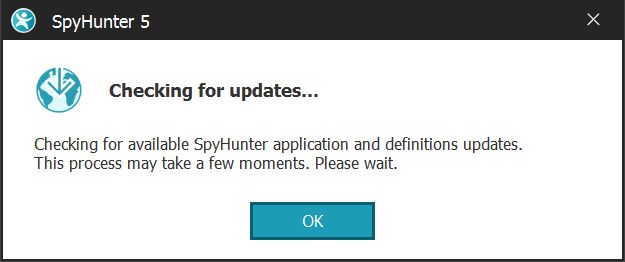
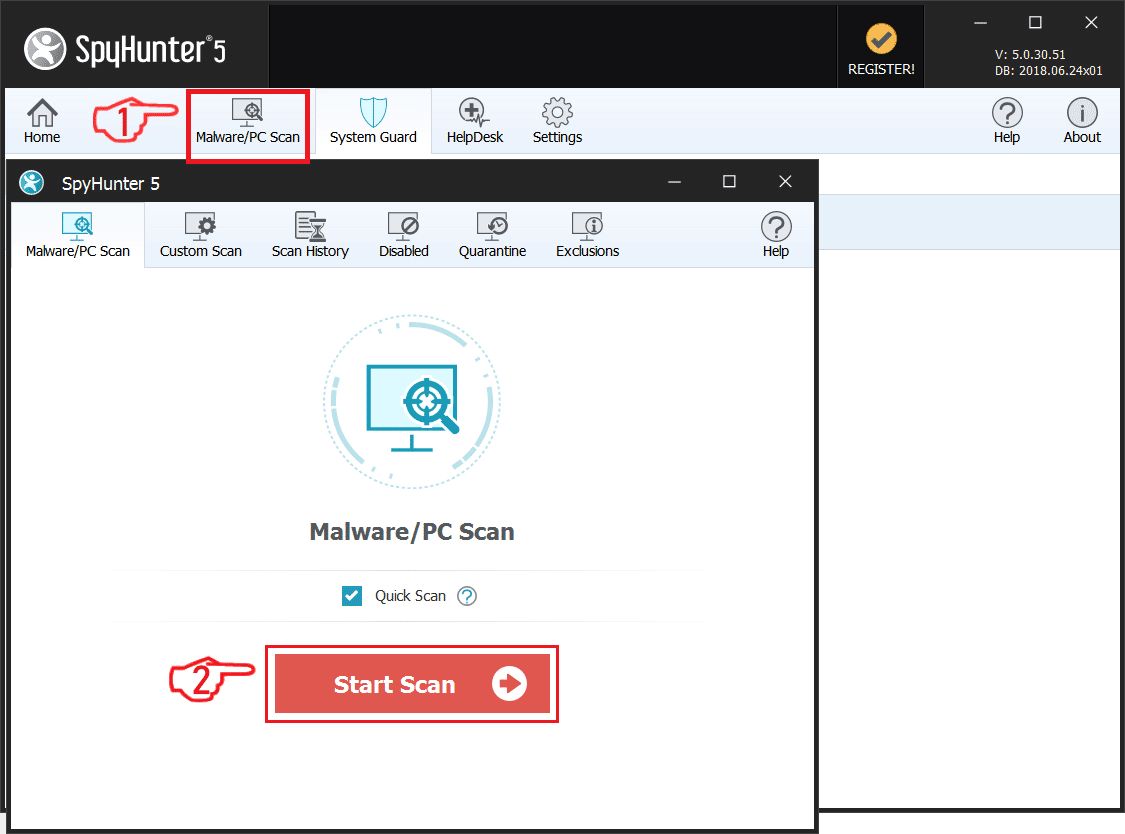
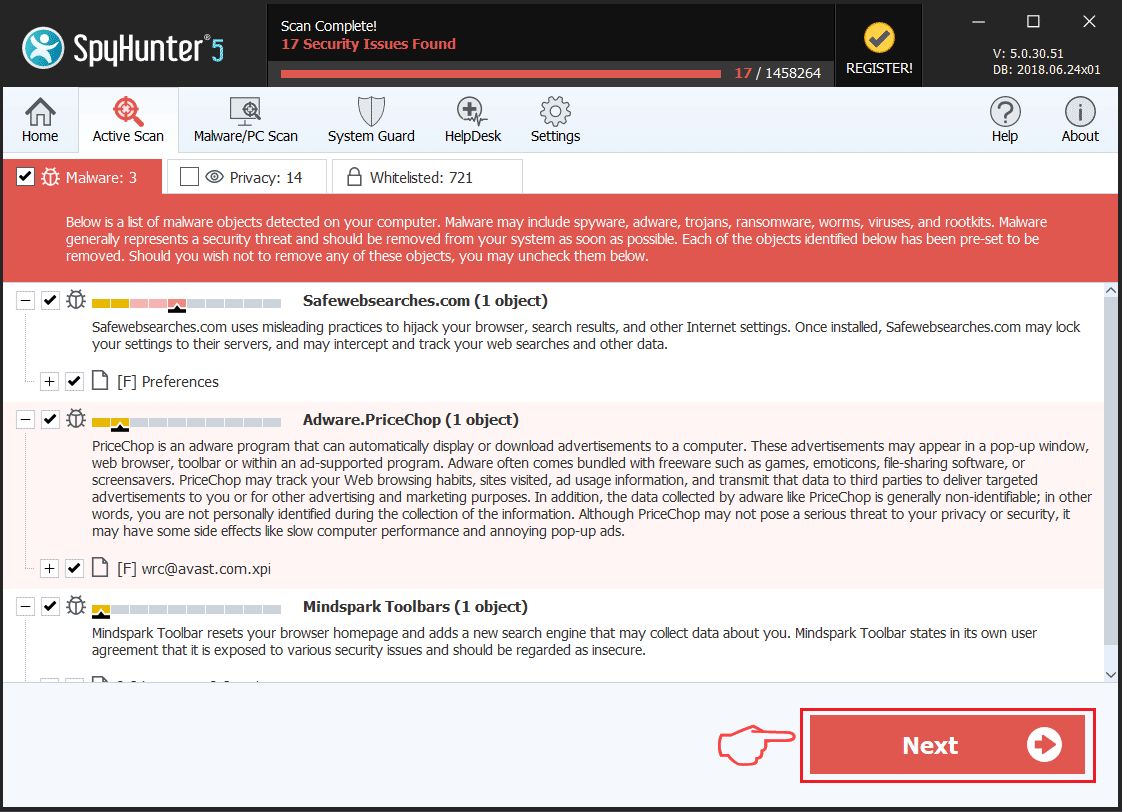
Step 2: Boot Your PC In Safe Mode

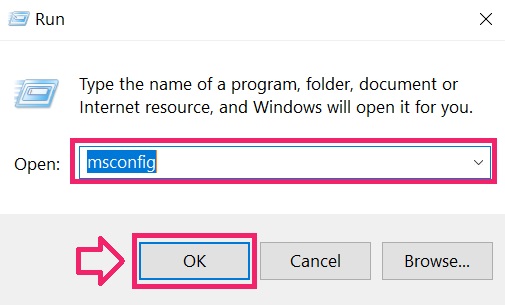
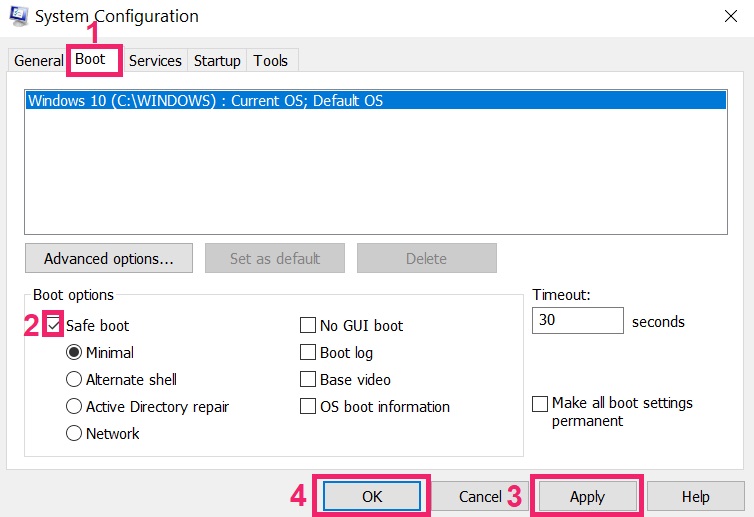
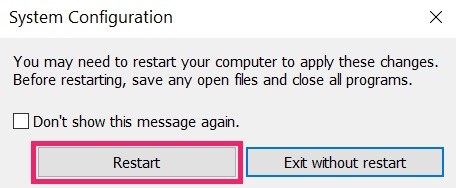
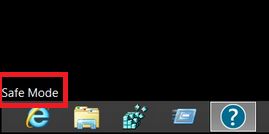
Step 3: Uninstall Precious Bible and related software from Windows
Uninstall Steps for Windows 11
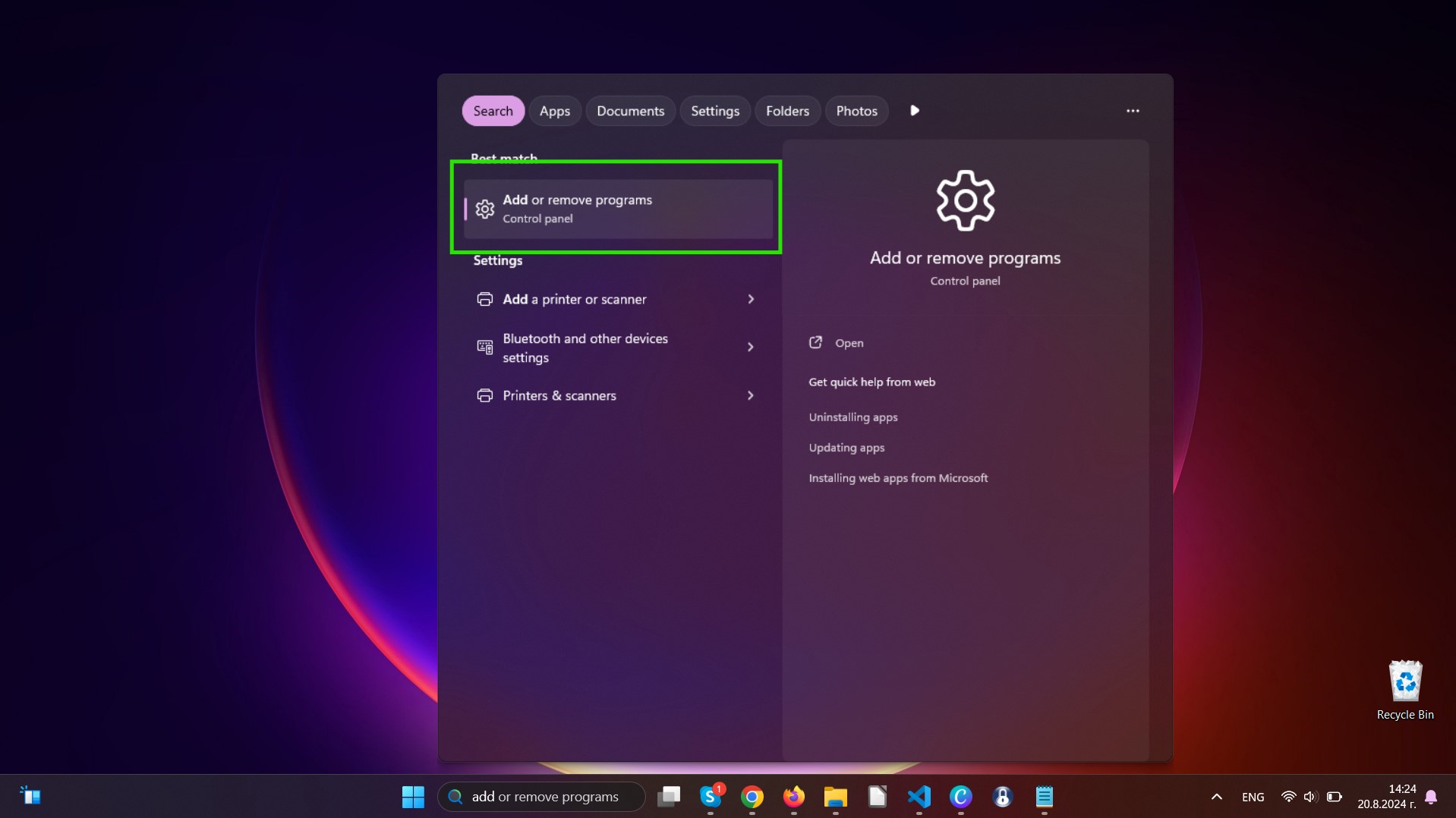
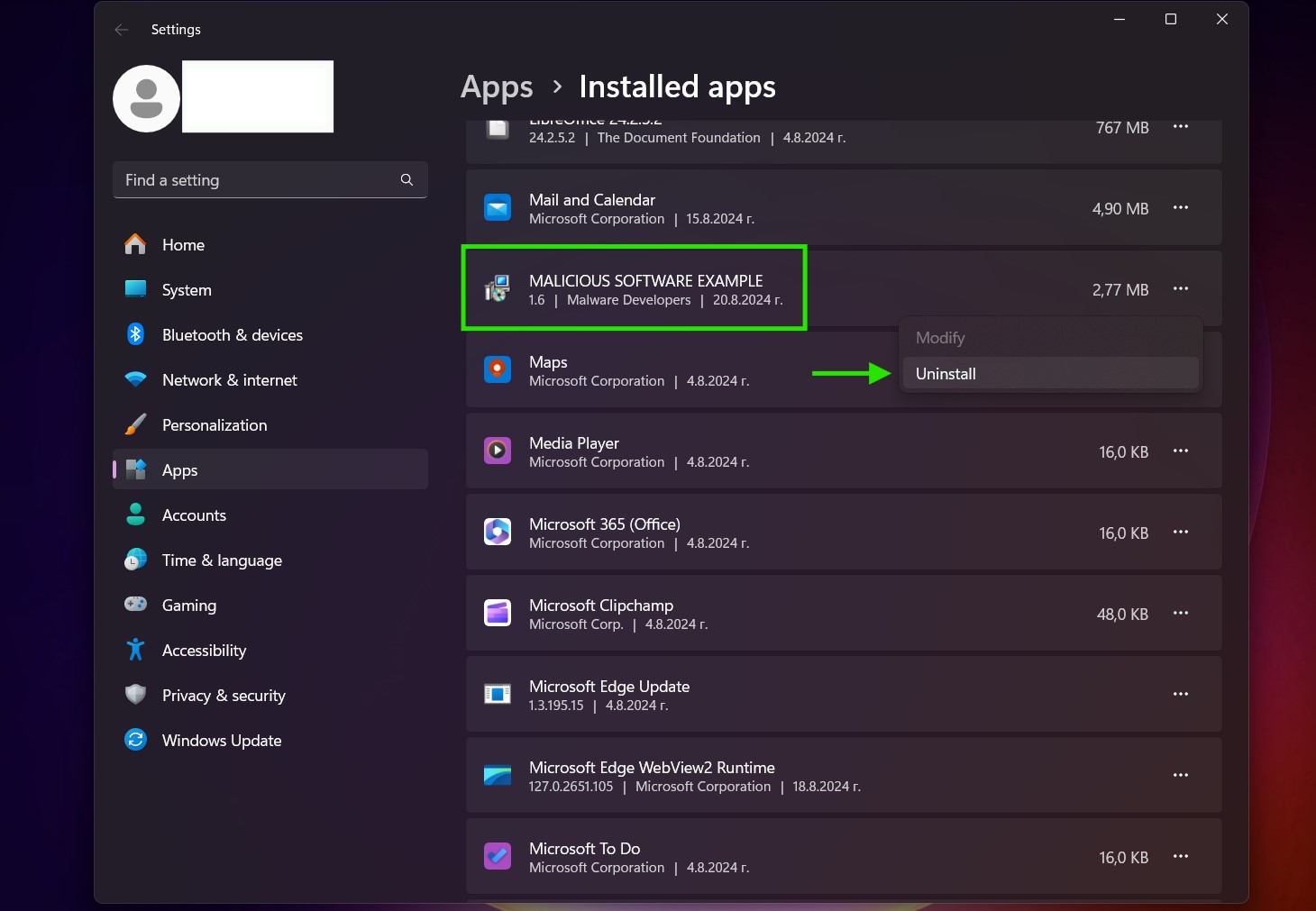
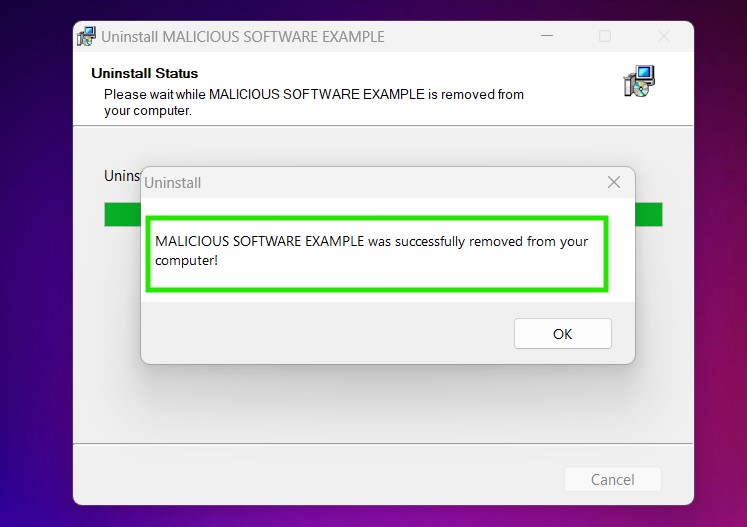
Uninstall Steps for Windows 10 and Older Versions
Here is a method in few easy steps that should be able to uninstall most programs. No matter if you are using Windows 10, 8, 7, Vista or XP, those steps will get the job done. Dragging the program or its folder to the recycle bin can be a very bad decision. If you do that, bits and pieces of the program are left behind, and that can lead to unstable work of your PC, errors with the file type associations and other unpleasant activities. The proper way to get a program off your computer is to Uninstall it. To do that:

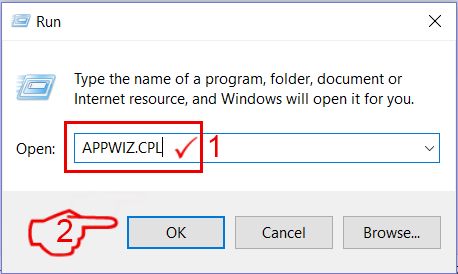
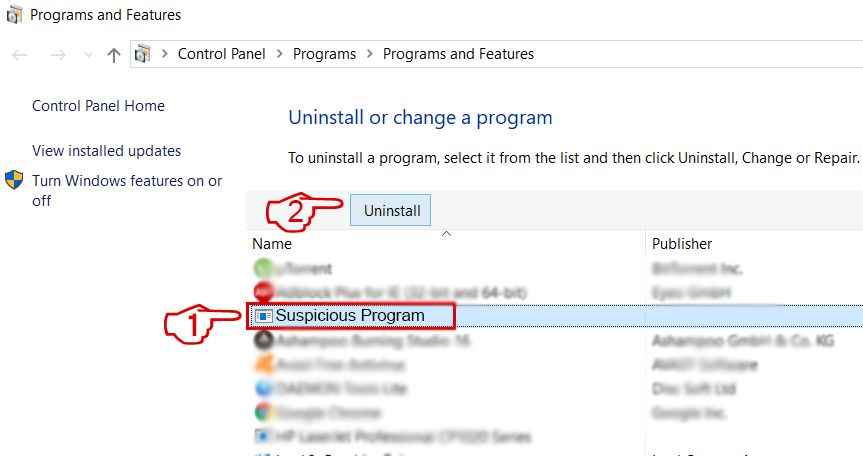 Follow the instructions above and you will successfully uninstall most programs.
Follow the instructions above and you will successfully uninstall most programs.
Step 4: Clean Any registries, Created by Precious Bible on Your PC.
The usually targeted registries of Windows machines are the following:
- HKEY_LOCAL_MACHINE\Software\Microsoft\Windows\CurrentVersion\Run
- HKEY_CURRENT_USER\Software\Microsoft\Windows\CurrentVersion\Run
- HKEY_LOCAL_MACHINE\Software\Microsoft\Windows\CurrentVersion\RunOnce
- HKEY_CURRENT_USER\Software\Microsoft\Windows\CurrentVersion\RunOnce
You can access them by opening the Windows registry editor and deleting any values, created by Precious Bible there. This can happen by following the steps underneath:
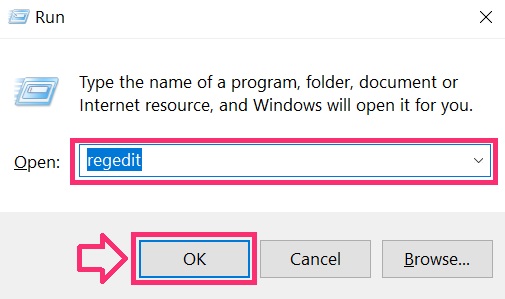

 Tip: To find a virus-created value, you can right-click on it and click "Modify" to see which file it is set to run. If this is the virus file location, remove the value.
Tip: To find a virus-created value, you can right-click on it and click "Modify" to see which file it is set to run. If this is the virus file location, remove the value.
Video Removal Guide for Precious Bible (Windows).
Get rid of Precious Bible from Mac OS X.
Step 1: Uninstall Precious Bible and remove related files and objects
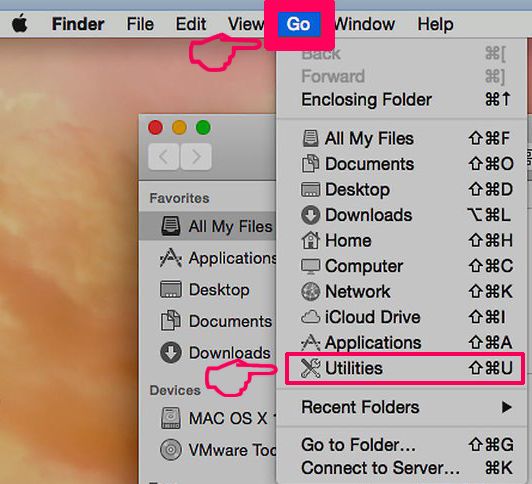
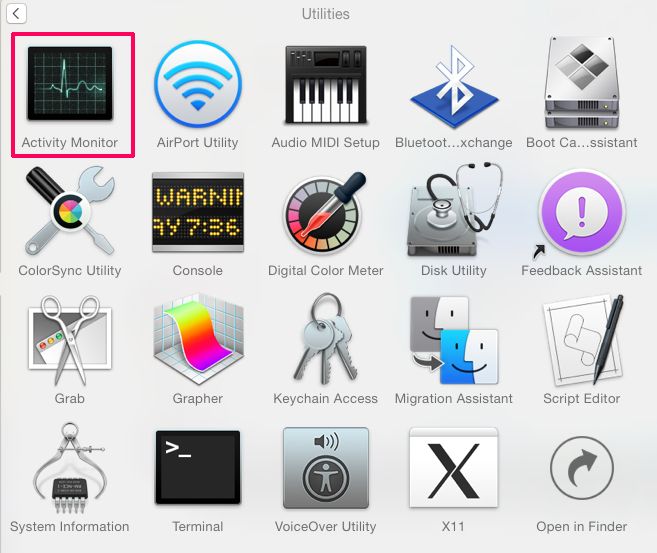
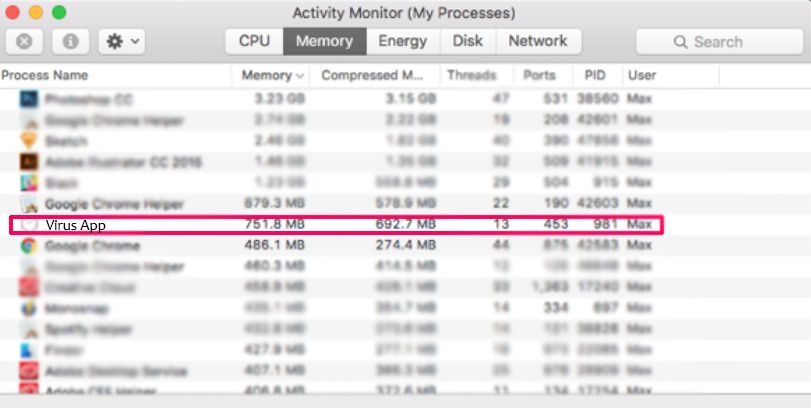
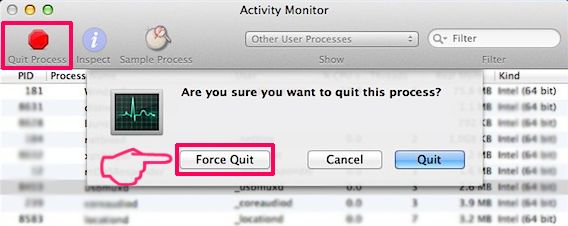
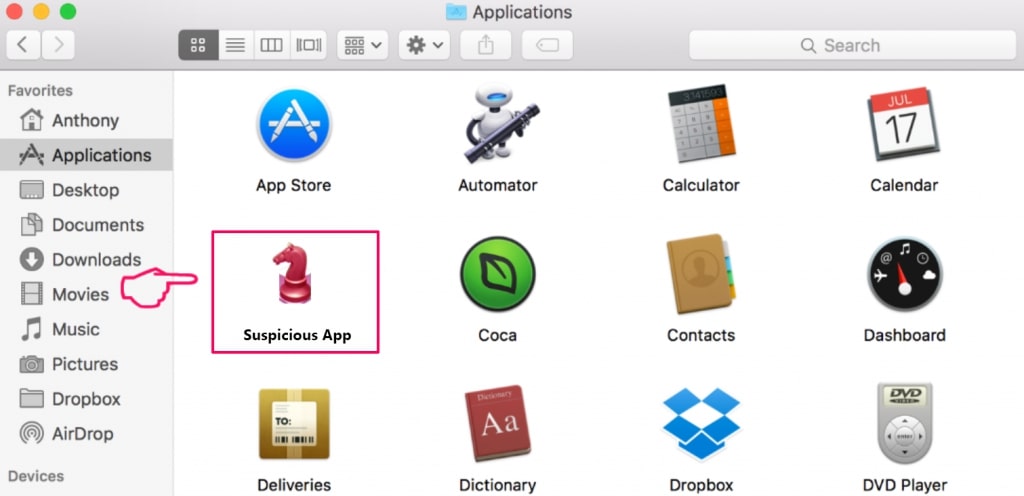
Your Mac will then show you a list of items that start automatically when you log in. Look for any suspicious apps identical or similar to Precious Bible. Check the app you want to stop from running automatically and then select on the Minus (“-“) icon to hide it.
- Go to Finder.
- In the search bar type the name of the app that you want to remove.
- Above the search bar change the two drop down menus to “System Files” and “Are Included” so that you can see all of the files associated with the application you want to remove. Bear in mind that some of the files may not be related to the app so be very careful which files you delete.
- If all of the files are related, hold the ⌘+A buttons to select them and then drive them to “Trash”.
In case you cannot remove Precious Bible via Step 1 above:
In case you cannot find the virus files and objects in your Applications or other places we have shown above, you can manually look for them in the Libraries of your Mac. But before doing this, please read the disclaimer below:
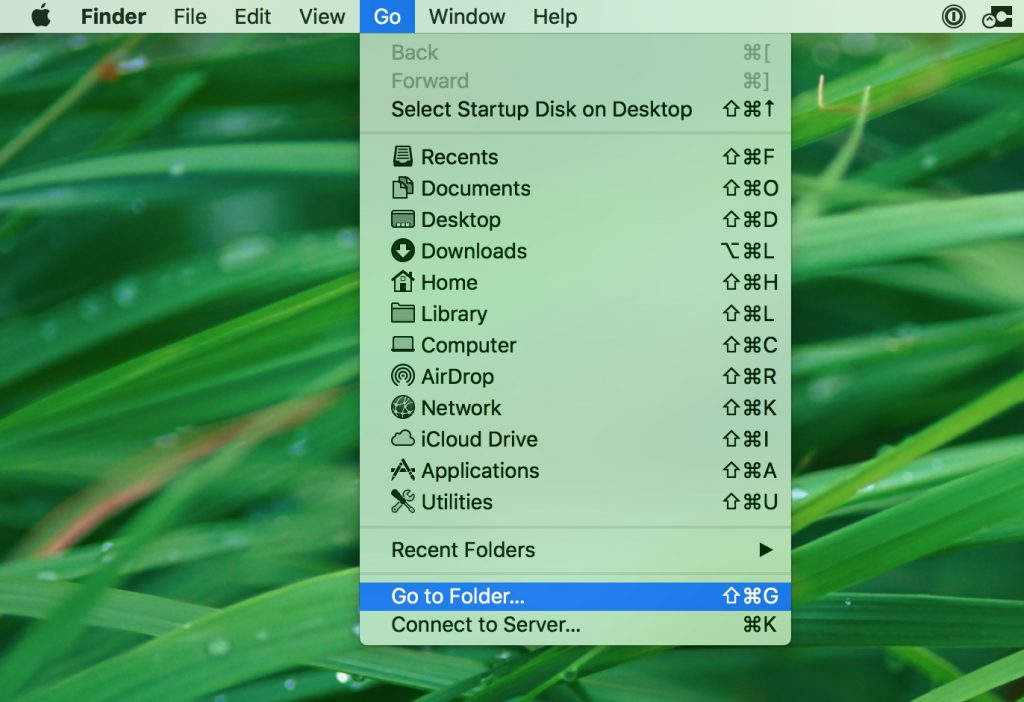
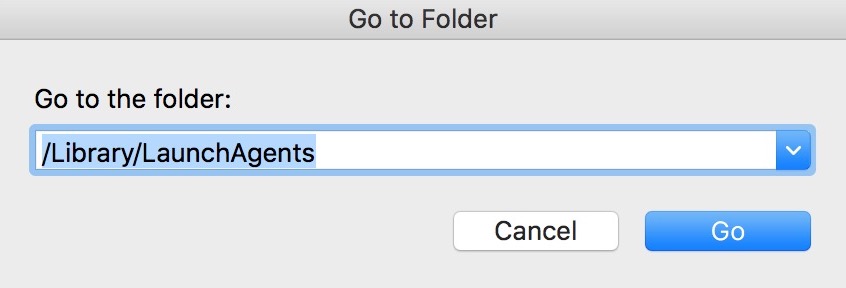
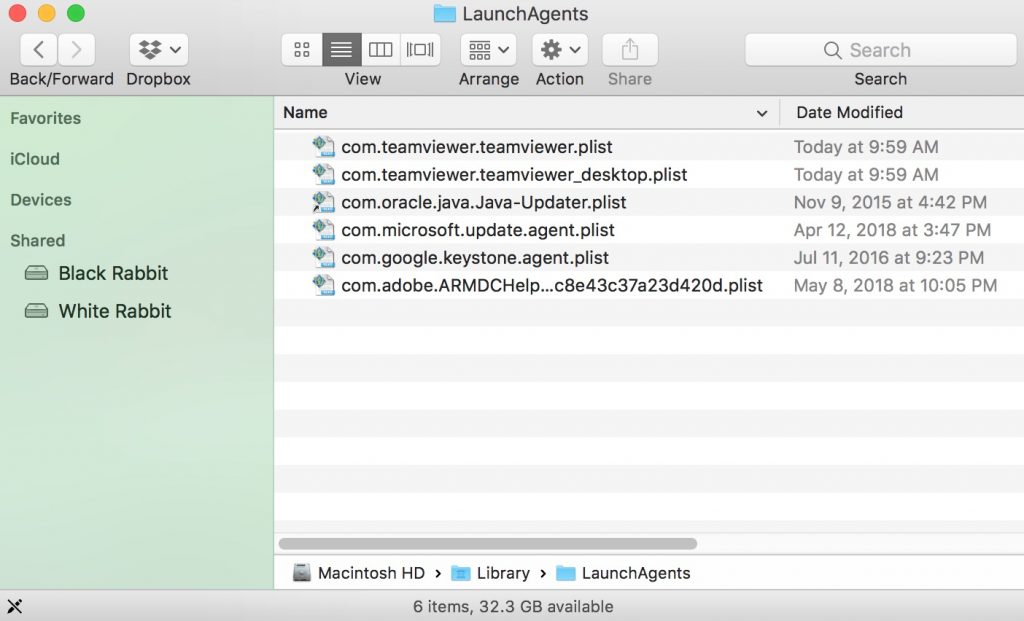
You can repeat the same procedure with the following other Library directories:
→ ~/Library/LaunchAgents
/Library/LaunchDaemons
Tip: ~ is there on purpose, because it leads to more LaunchAgents.
Step 2: Scan for and remove Precious Bible files from your Mac
When you are facing problems on your Mac as a result of unwanted scripts and programs such as Precious Bible, the recommended way of eliminating the threat is by using an anti-malware program. SpyHunter for Mac offers advanced security features along with other modules that will improve your Mac’s security and protect it in the future.
Video Removal Guide for Precious Bible (Mac)
Remove Precious Bible from Google Chrome.
Step 1: Start Google Chrome and open the drop menu
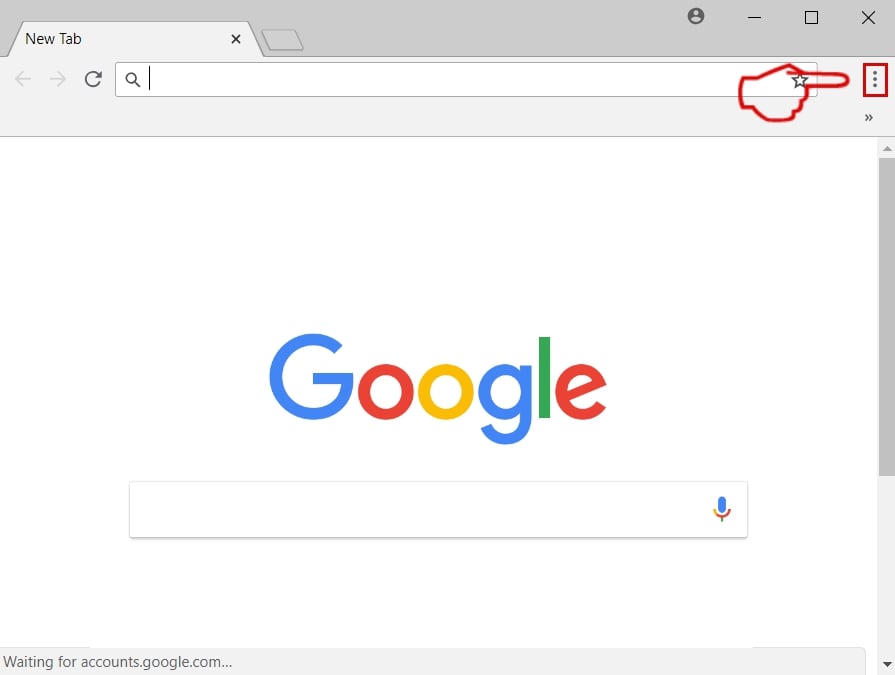
Step 2: Move the cursor over "Tools" and then from the extended menu choose "Extensions"
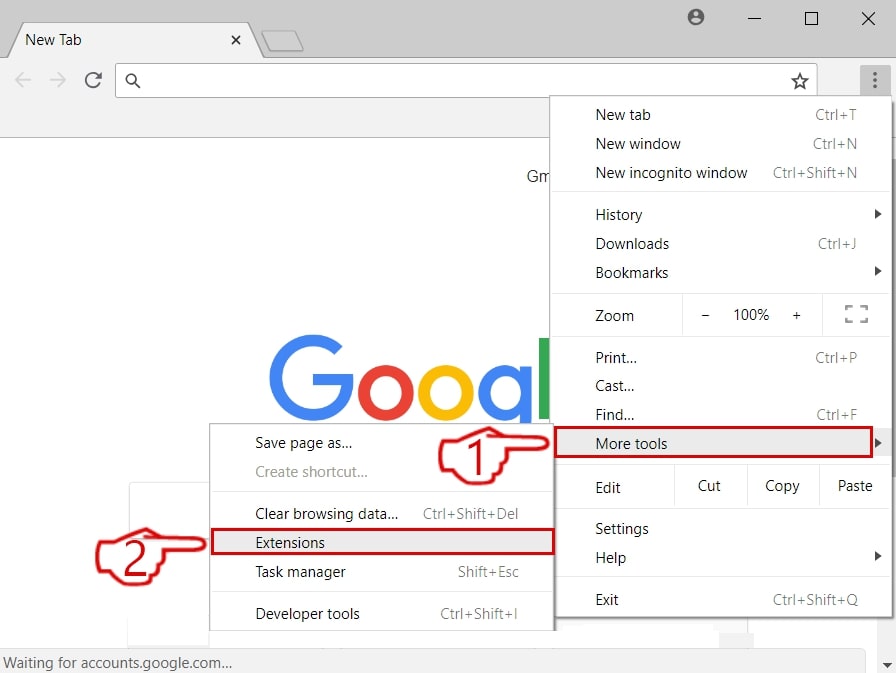
Step 3: From the opened "Extensions" menu locate the unwanted extension and click on its "Remove" button.
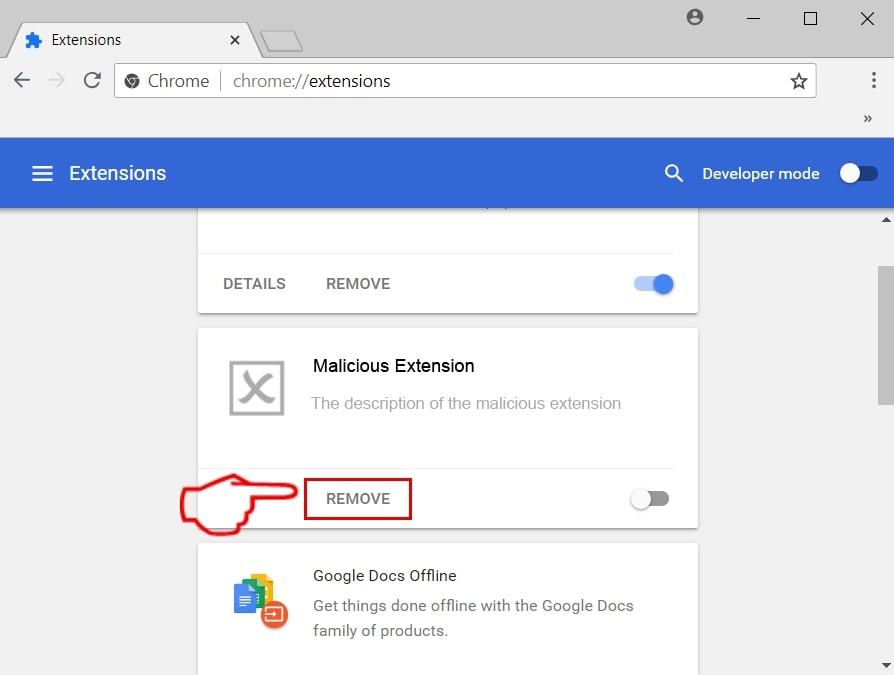
Step 4: After the extension is removed, restart Google Chrome by closing it from the red "X" button at the top right corner and start it again.
Erase Precious Bible from Mozilla Firefox.
Step 1: Start Mozilla Firefox. Open the menu window:
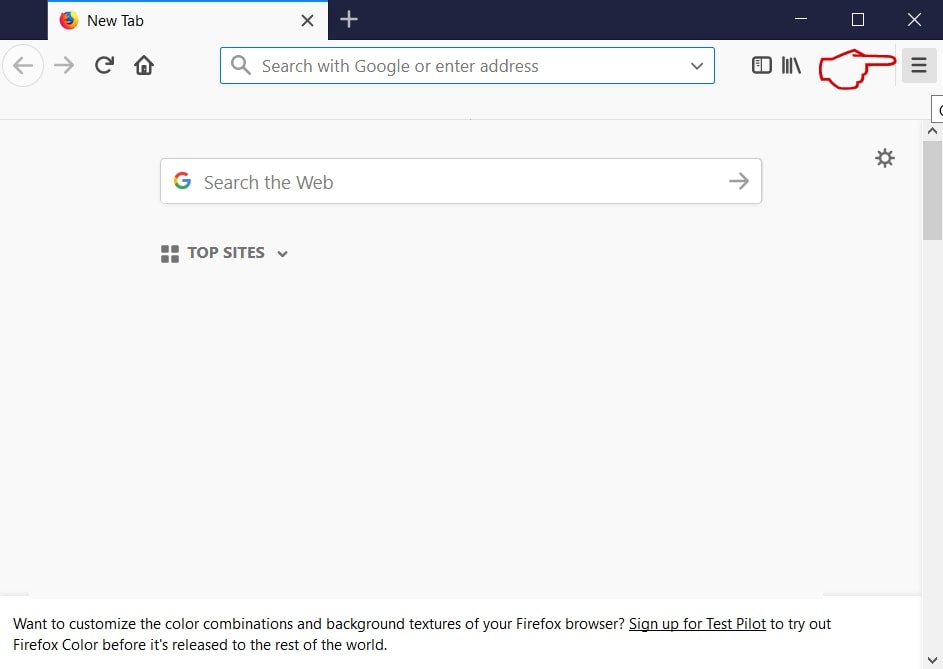
Step 2: Select the "Add-ons" icon from the menu.
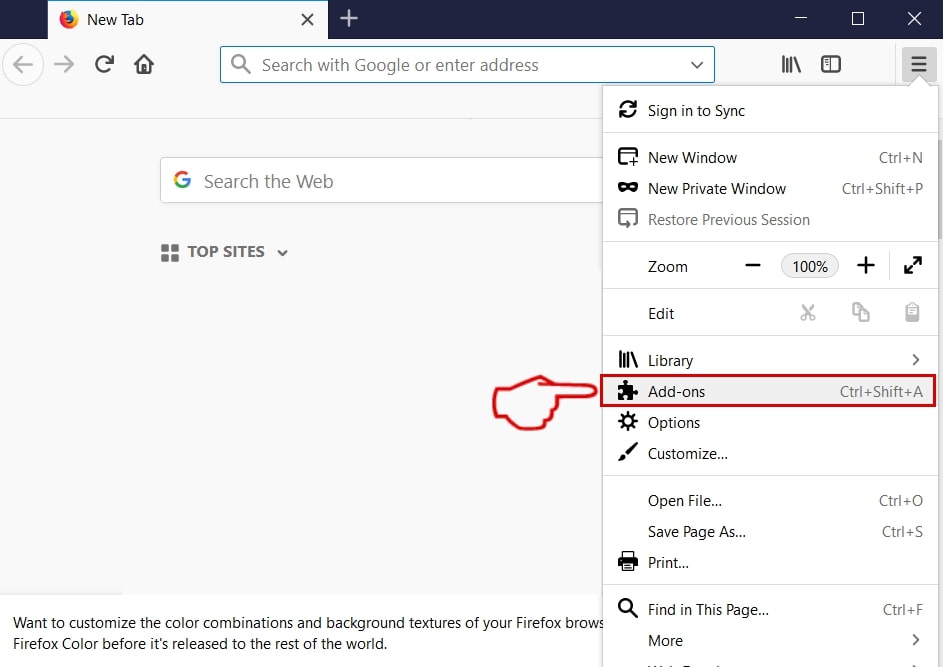
Step 3: Select the unwanted extension and click "Remove"

Step 4: After the extension is removed, restart Mozilla Firefox by closing it from the red "X" button at the top right corner and start it again.
Uninstall Precious Bible from Microsoft Edge.
Step 1: Start Edge browser.
Step 2: Open the drop menu by clicking on the icon at the top right corner.
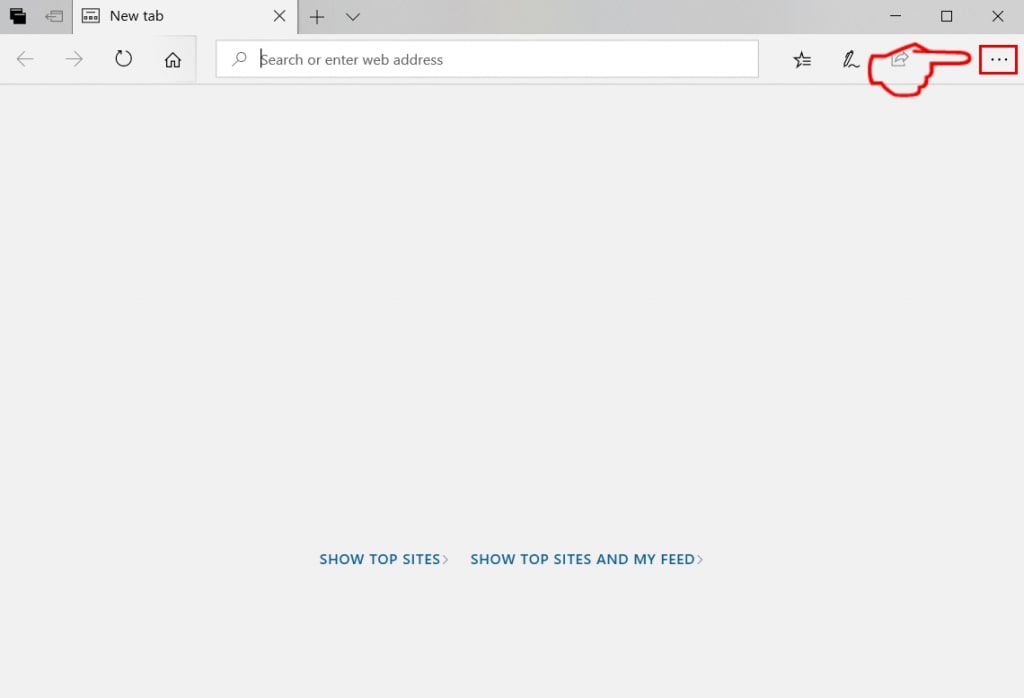
Step 3: From the drop menu select "Extensions".
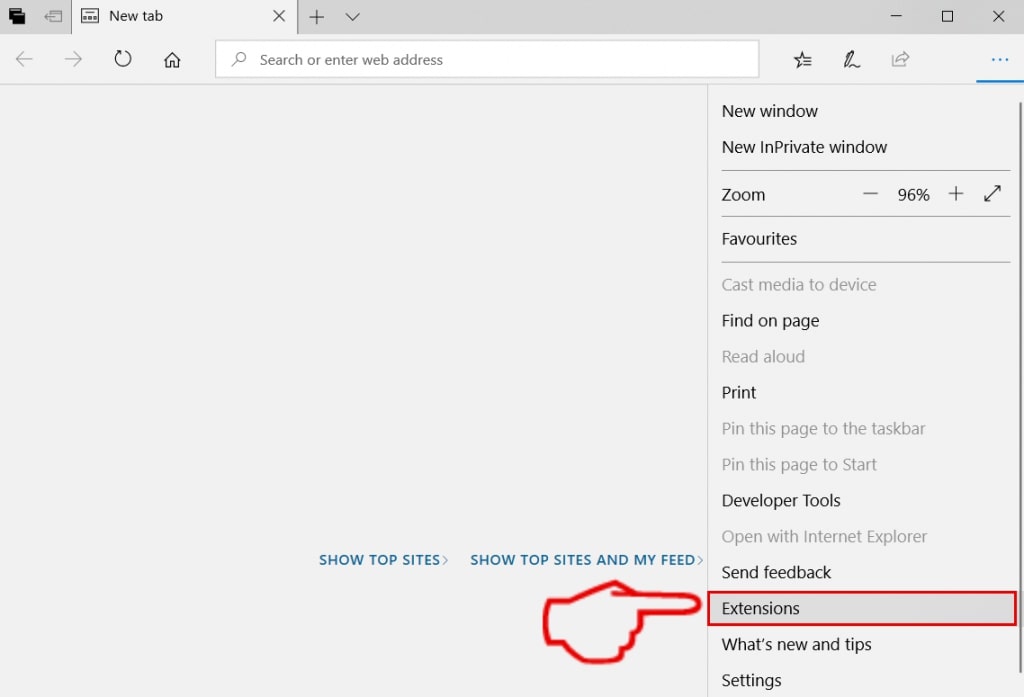
Step 4: Choose the suspected malicious extension you want to remove and then click on the gear icon.
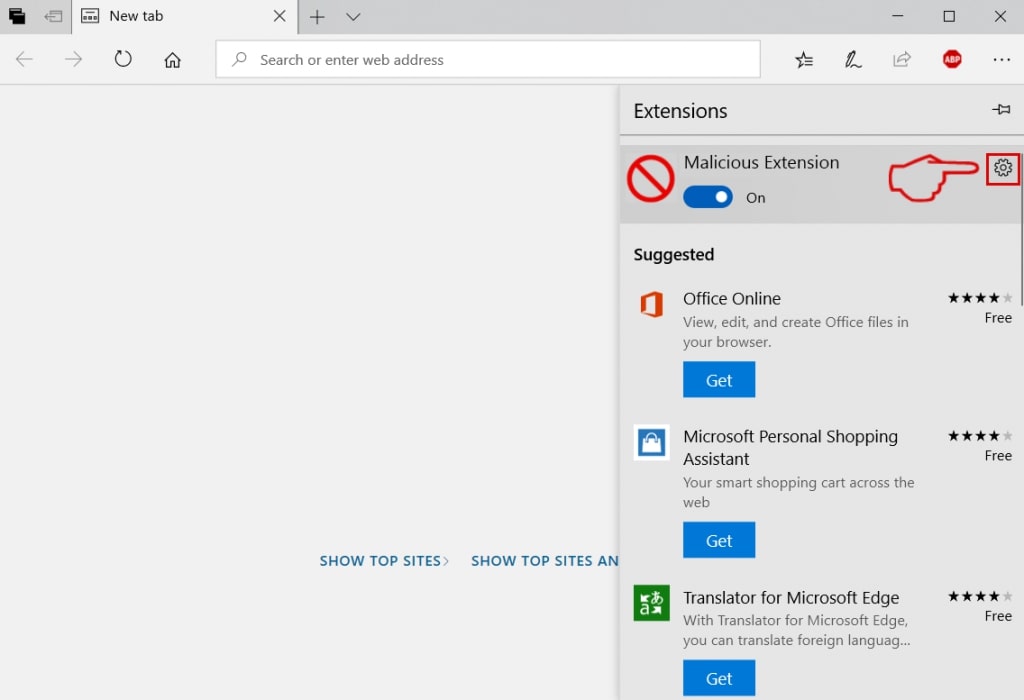
Step 5: Remove the malicious extension by scrolling down and then clicking on Uninstall.
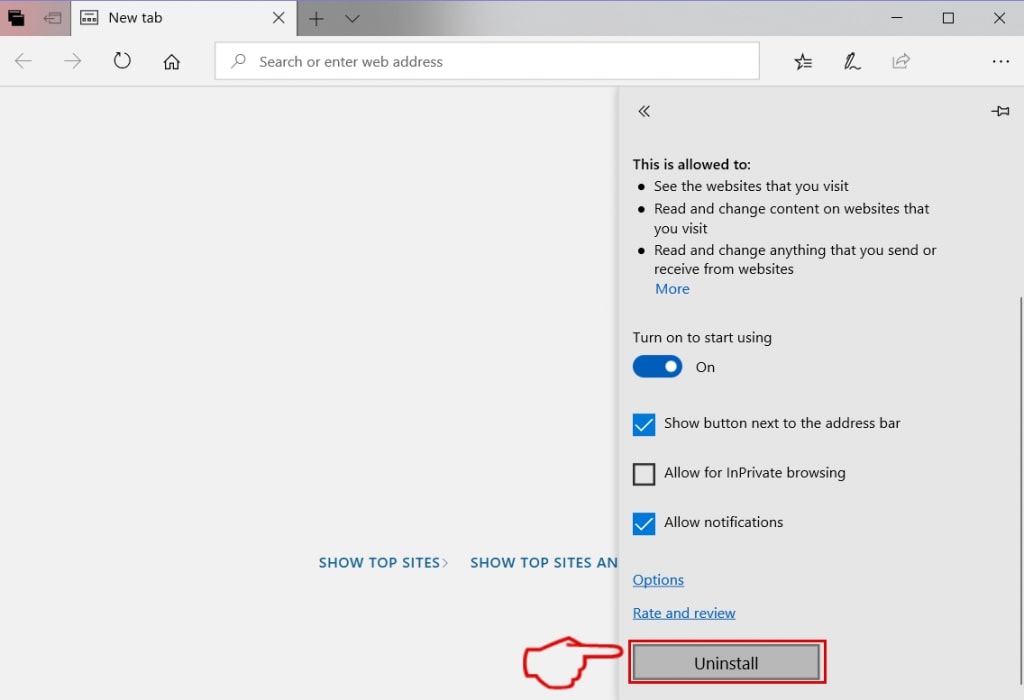
Remove Precious Bible from Safari
Step 1: Start the Safari app.
Step 2: After hovering your mouse cursor to the top of the screen, click on the Safari text to open its drop down menu.
Step 3: From the menu, click on "Preferences".
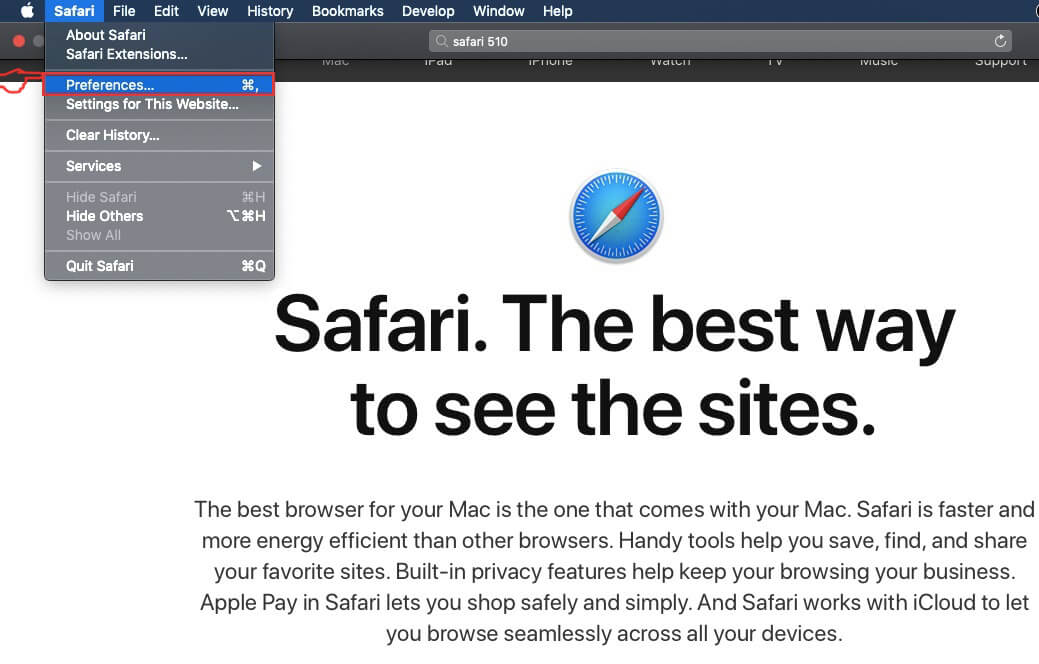
Step 4: After that, select the 'Extensions' Tab.

Step 5: Click once on the extension you want to remove.
Step 6: Click 'Uninstall'.
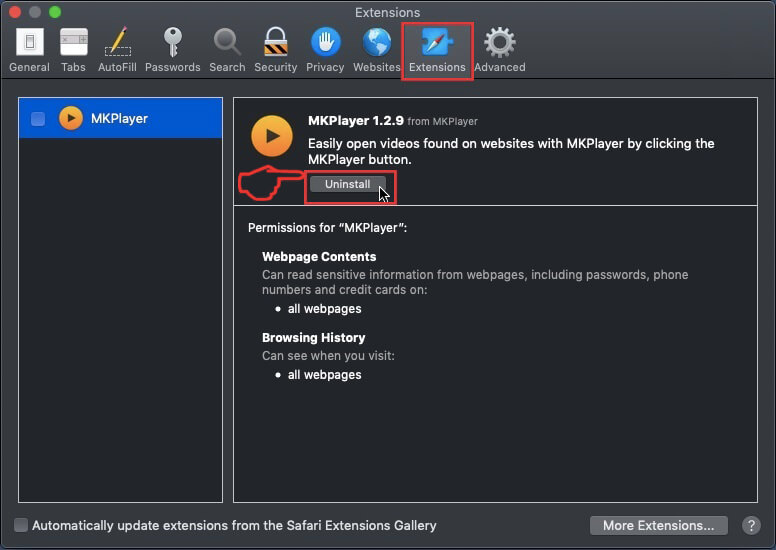
A pop-up window will appear asking for confirmation to uninstall the extension. Select 'Uninstall' again, and the Precious Bible will be removed.
Eliminate Precious Bible from Internet Explorer.
Step 1: Start Internet Explorer.
Step 2: Click on the gear icon labeled 'Tools' to open the drop menu and select 'Manage Add-ons'
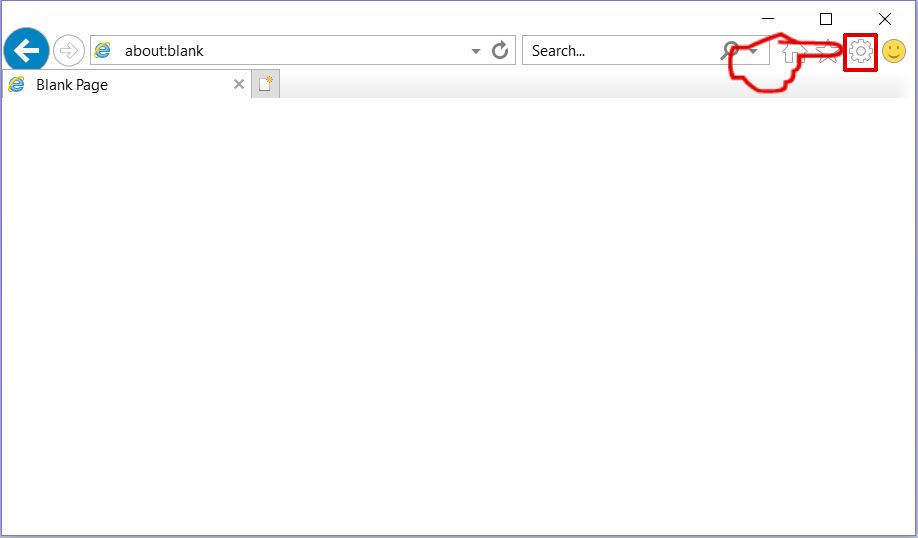
Step 3: In the 'Manage Add-ons' window.
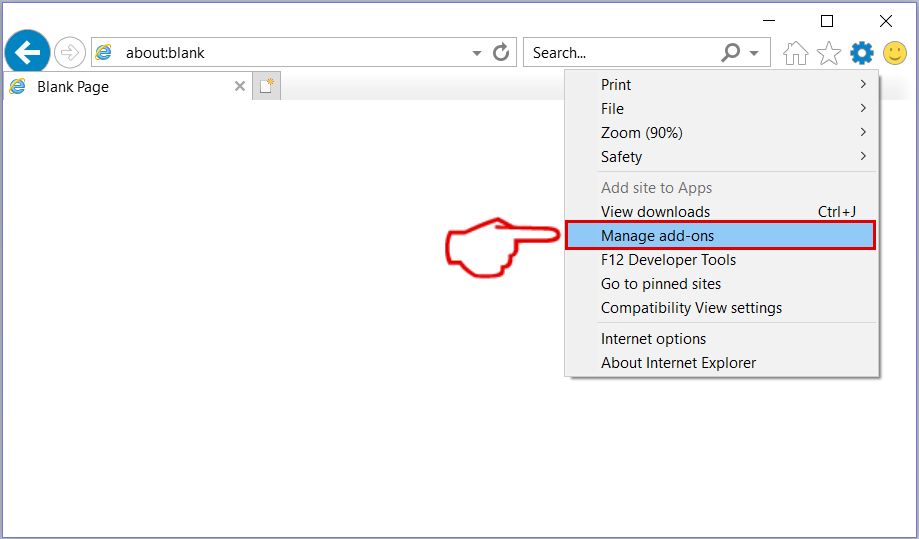
Step 4: Select the extension you want to remove and then click 'Disable'. A pop-up window will appear to inform you that you are about to disable the selected extension, and some more add-ons might be disabled as well. Leave all the boxes checked, and click 'Disable'.
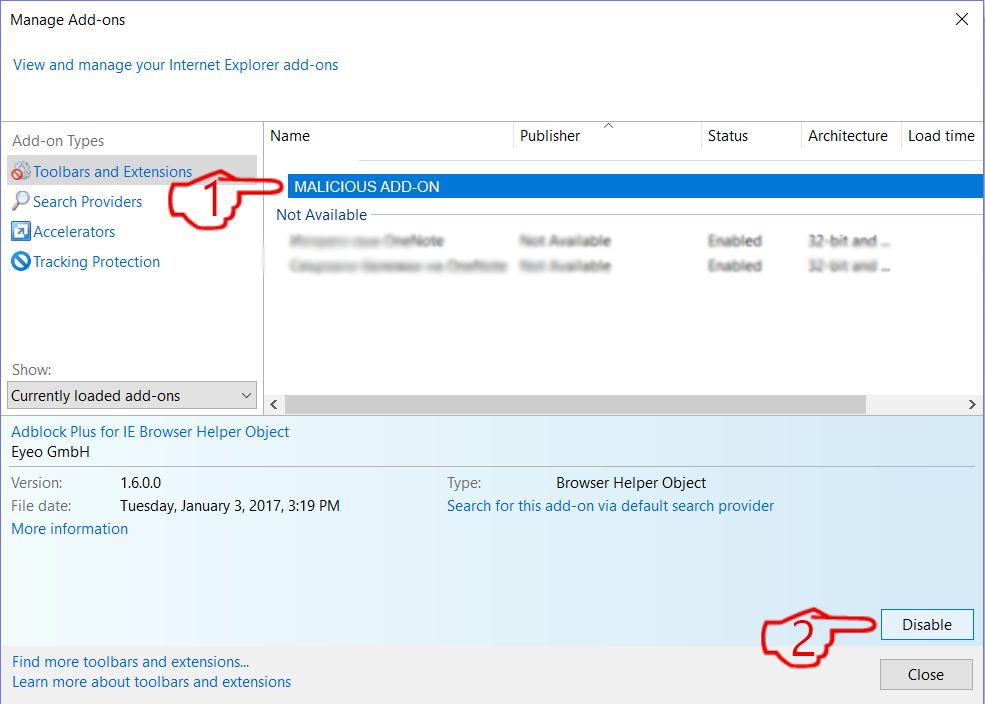
Step 5: After the unwanted extension has been removed, restart Internet Explorer by closing it from the red 'X' button located at the top right corner and start it again.
Remove Push Notifications from Your Browsers
Turn Off Push Notifications from Google Chrome
To disable any Push Notices from Google Chrome browser, please follow the steps below:
Step 1: Go to Settings in Chrome.
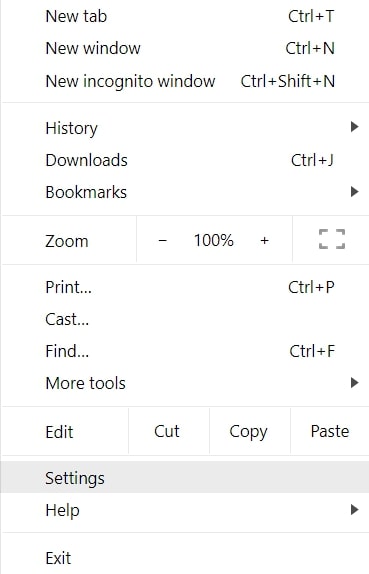
Step 2: In Settings, select “Advanced Settings”:
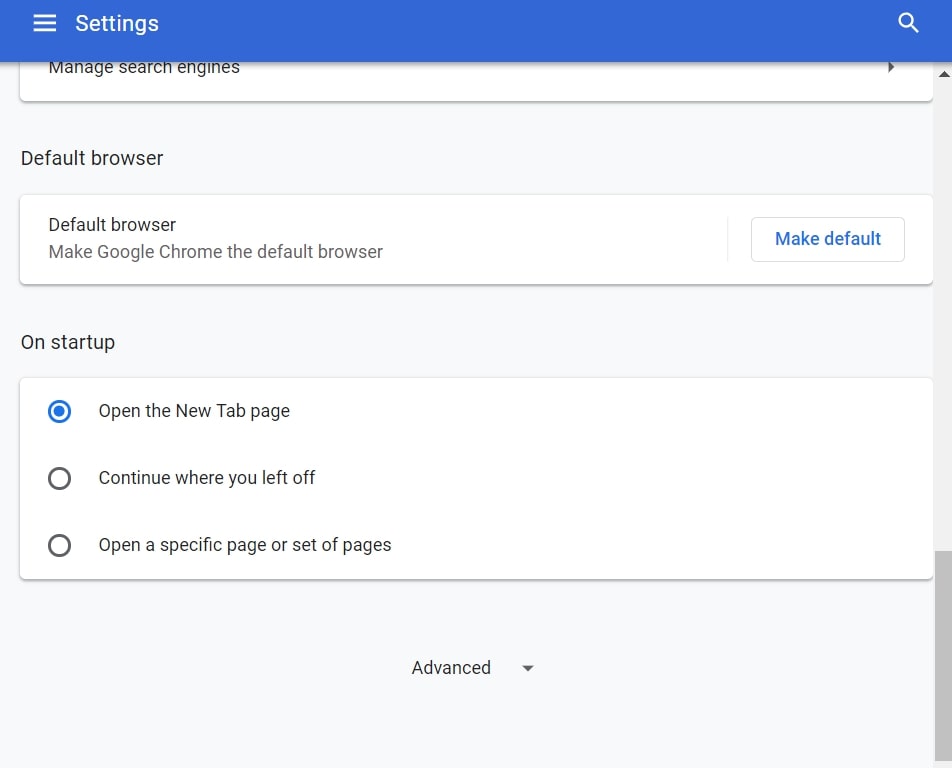
Step 3: Click “Content Settings”:
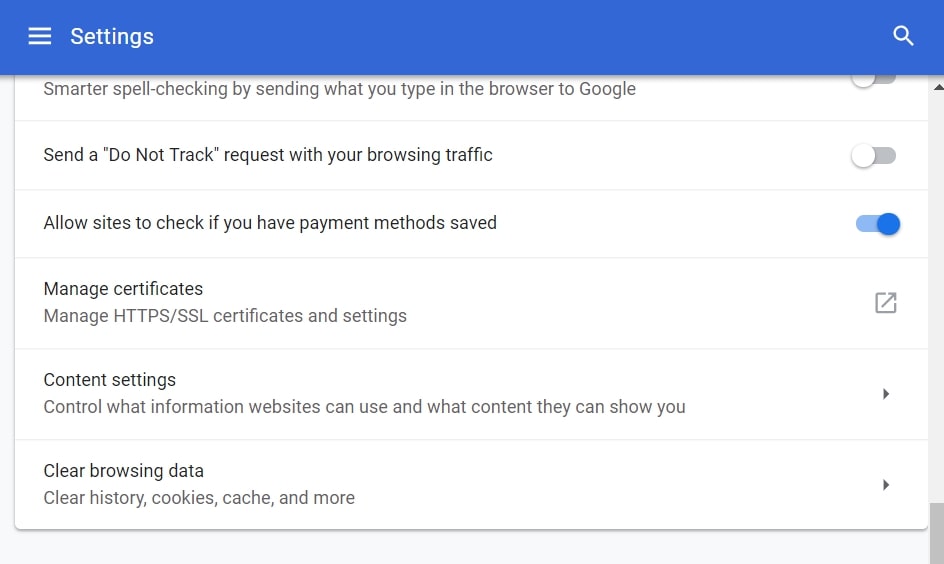
Step 4: Open “Notifications”:
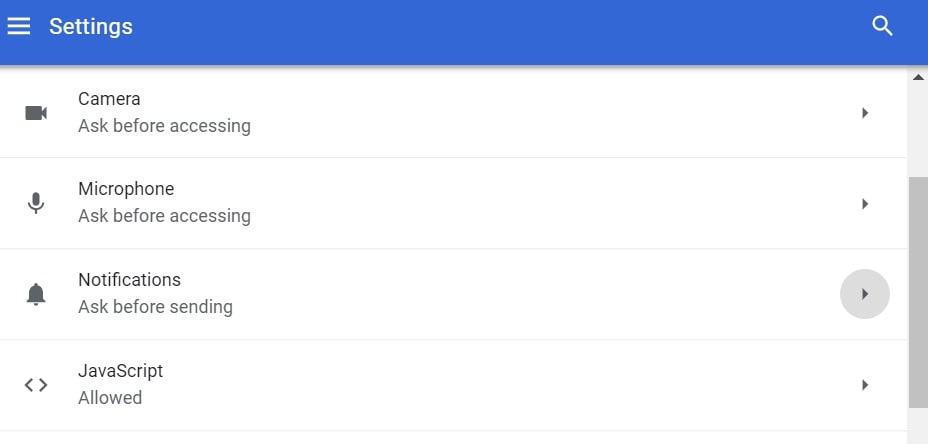
Step 5: Click the three dots and choose Block, Edit or Remove options:

Remove Push Notifications on Firefox
Step 1: Go to Firefox Options.
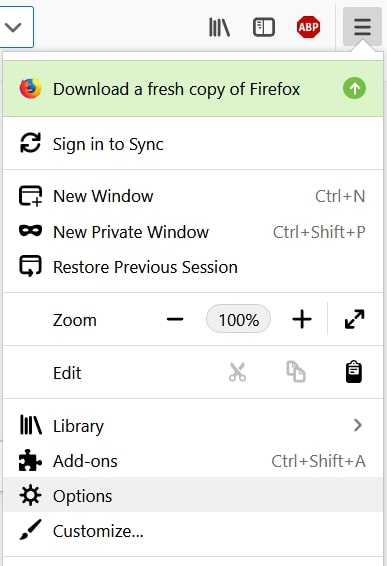
Step 2: Go to “Settings”, type “notifications” in the search bar and click "Settings":
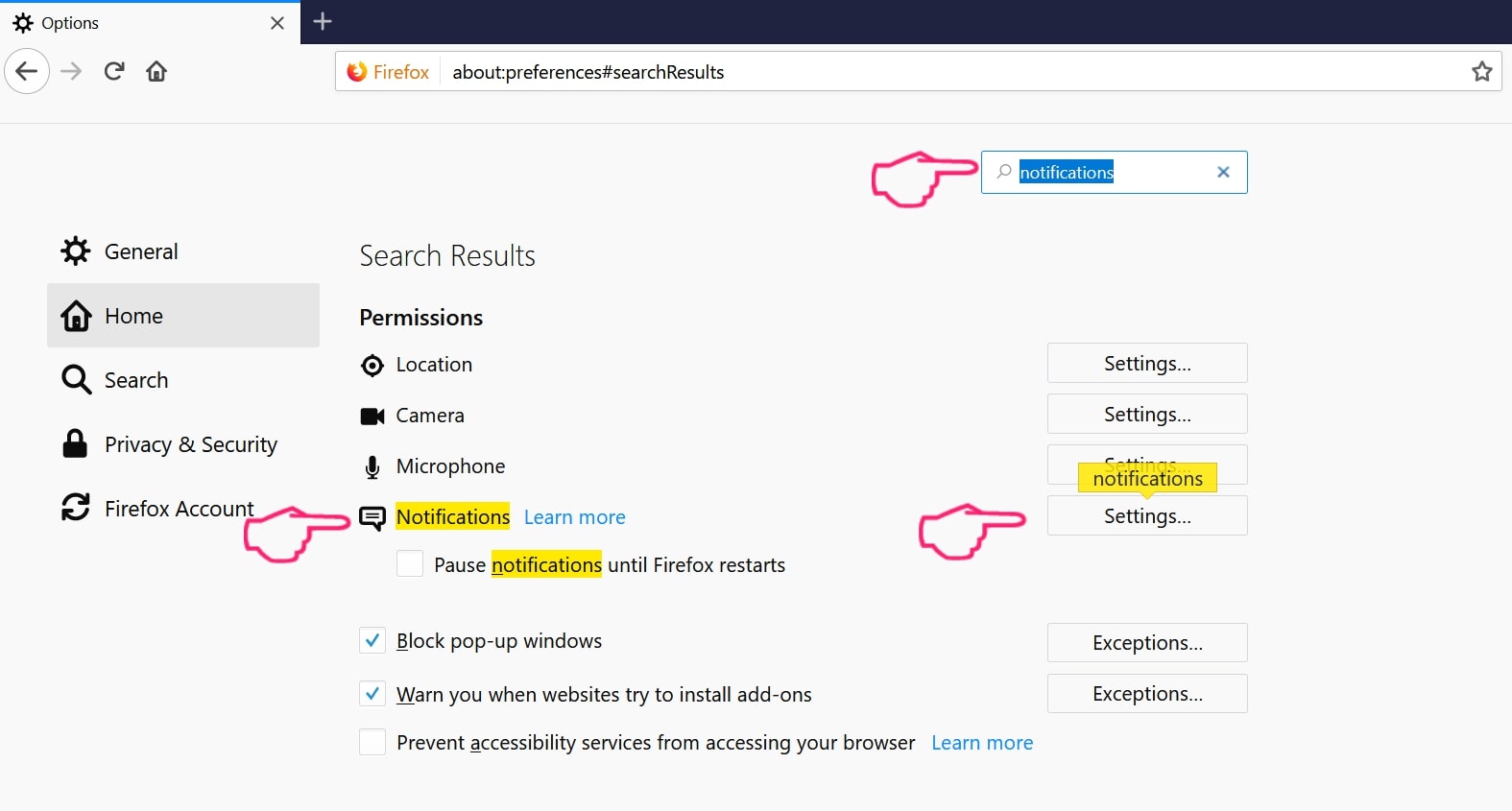
Step 3: Click “Remove” on any site you wish notifications gone and click “Save Changes”
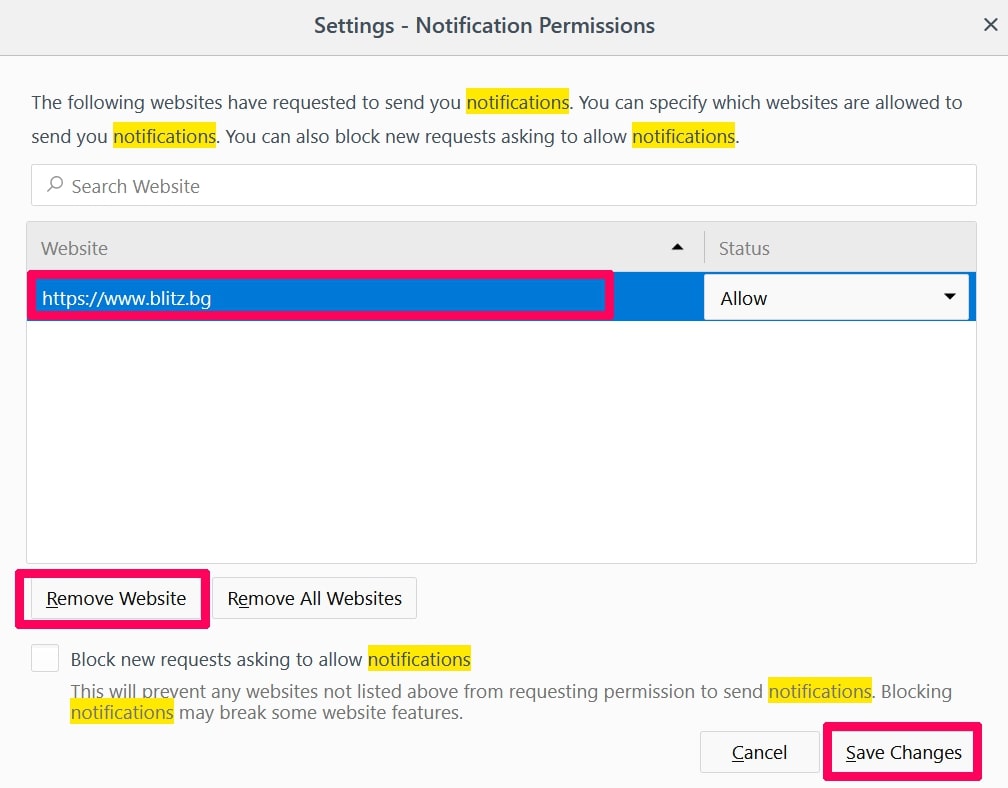
Stop Push Notifications on Opera
Step 1: In Opera, press ALT+P to go to Settings.

Step 2: In Setting search, type “Content” to go to Content Settings.
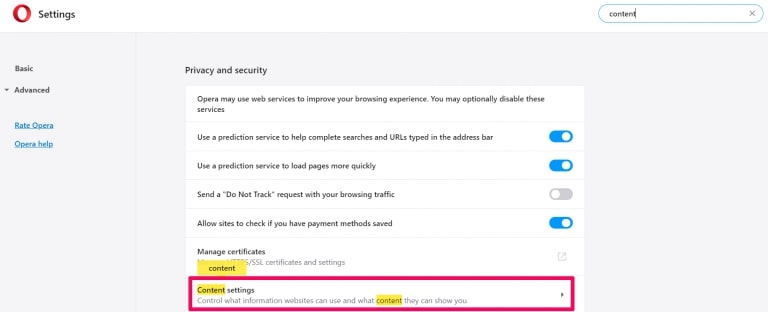
Step 3: Open Notifications:
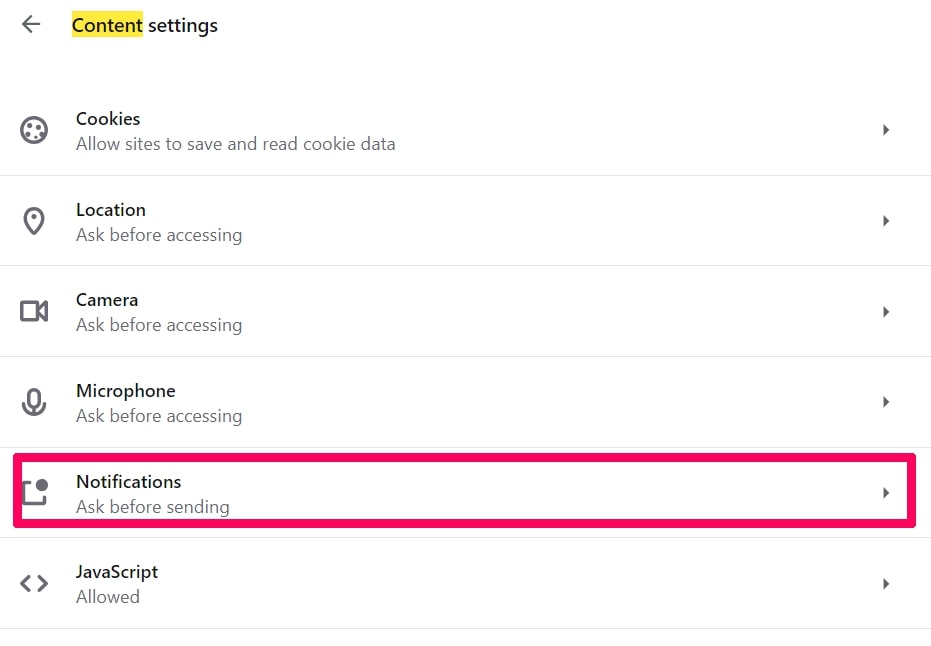
Step 4: Do the same as you did with Google Chrome (explained below):
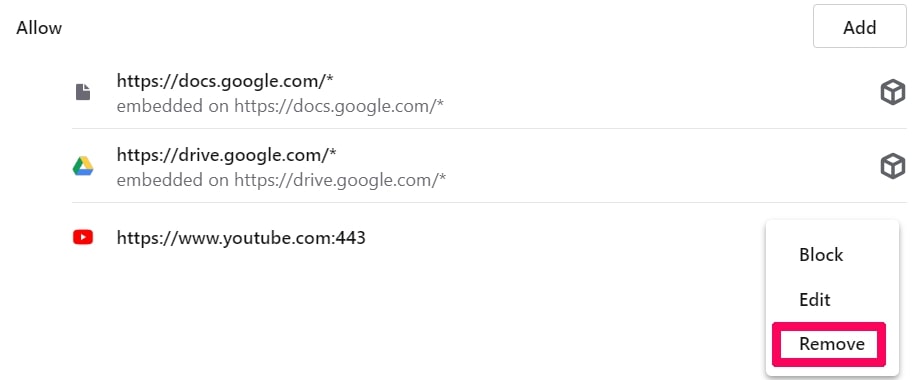
Eliminate Push Notifications on Safari
Step 1: Open Safari Preferences.
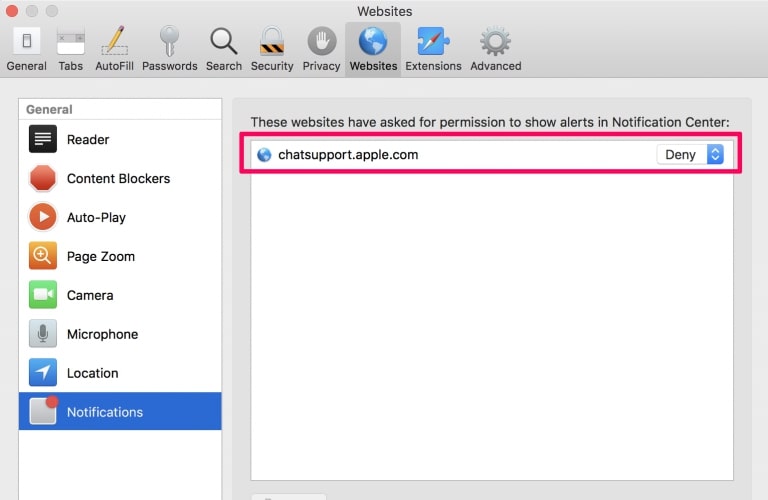
Step 2: Choose the domain from where you like push pop-ups gone and change to "Deny" from "Allow".
Precious Bible-FAQ
What Is Precious Bible?
The Precious Bible threat is adware or browser redirect virus.
It may slow your computer down significantly and display advertisements. The main idea is for your information to likely get stolen or more ads to appear on your device.
The creators of such unwanted apps work with pay-per-click schemes to get your computer to visit risky or different types of websites that may generate them funds. This is why they do not even care what types of websites show up on the ads. This makes their unwanted software indirectly risky for your OS.
What Are the Symptoms of Precious Bible?
There are several symptoms to look for when this particular threat and also unwanted apps in general are active:
Symptom #1: Your computer may become slow and have poor performance in general.
Symptom #2: You have toolbars, add-ons or extensions on your web browsers that you don't remember adding.
Symptom #3: You see all types of ads, like ad-supported search results, pop-ups and redirects to randomly appear.
Symptom #4: You see installed apps on your Mac running automatically and you do not remember installing them.
Symptom #5: You see suspicious processes running in your Task Manager.
If you see one or more of those symptoms, then security experts recommend that you check your computer for viruses.
What Types of Unwanted Programs Are There?
According to most malware researchers and cyber-security experts, the threats that can currently affect your device can be rogue antivirus software, adware, browser hijackers, clickers, fake optimizers and any forms of PUPs.
What to Do If I Have a "virus" like Precious Bible?
With few simple actions. First and foremost, it is imperative that you follow these steps:
Step 1: Find a safe computer and connect it to another network, not the one that your Mac was infected in.
Step 2: Change all of your passwords, starting from your email passwords.
Step 3: Enable two-factor authentication for protection of your important accounts.
Step 4: Call your bank to change your credit card details (secret code, etc.) if you have saved your credit card for online shopping or have done online activities with your card.
Step 5: Make sure to call your ISP (Internet provider or carrier) and ask them to change your IP address.
Step 6: Change your Wi-Fi password.
Step 7: (Optional): Make sure to scan all of the devices connected to your network for viruses and repeat these steps for them if they are affected.
Step 8: Install anti-malware software with real-time protection on every device you have.
Step 9: Try not to download software from sites you know nothing about and stay away from low-reputation websites in general.
If you follow these recommendations, your network and all devices will become significantly more secure against any threats or information invasive software and be virus free and protected in the future too.
How Does Precious Bible Work?
Once installed, Precious Bible can collect data using trackers. This data is about your web browsing habits, such as the websites you visit and the search terms you use. It is then used to target you with ads or to sell your information to third parties.
Precious Bible can also download other malicious software onto your computer, such as viruses and spyware, which can be used to steal your personal information and show risky ads, that may redirect to virus sites or scams.
Is Precious Bible Malware?
The truth is that PUPs (adware, browser hijackers) are not viruses, but may be just as dangerous since they may show you and redirect you to malware websites and scam pages.
Many security experts classify potentially unwanted programs as malware. This is because of the unwanted effects that PUPs can cause, such as displaying intrusive ads and collecting user data without the user’s knowledge or consent.
About the Precious Bible Research
The content we publish on SensorsTechForum.com, this Precious Bible how-to removal guide included, is the outcome of extensive research, hard work and our team’s devotion to help you remove the specific, adware-related problem, and restore your browser and computer system.
How did we conduct the research on Precious Bible?
Please note that our research is based on independent investigation. We are in contact with independent security researchers, thanks to which we receive daily updates on the latest malware, adware, and browser hijacker definitions.
Furthermore, the research behind the Precious Bible threat is backed with VirusTotal.
To better understand this online threat, please refer to the following articles which provide knowledgeable details.



